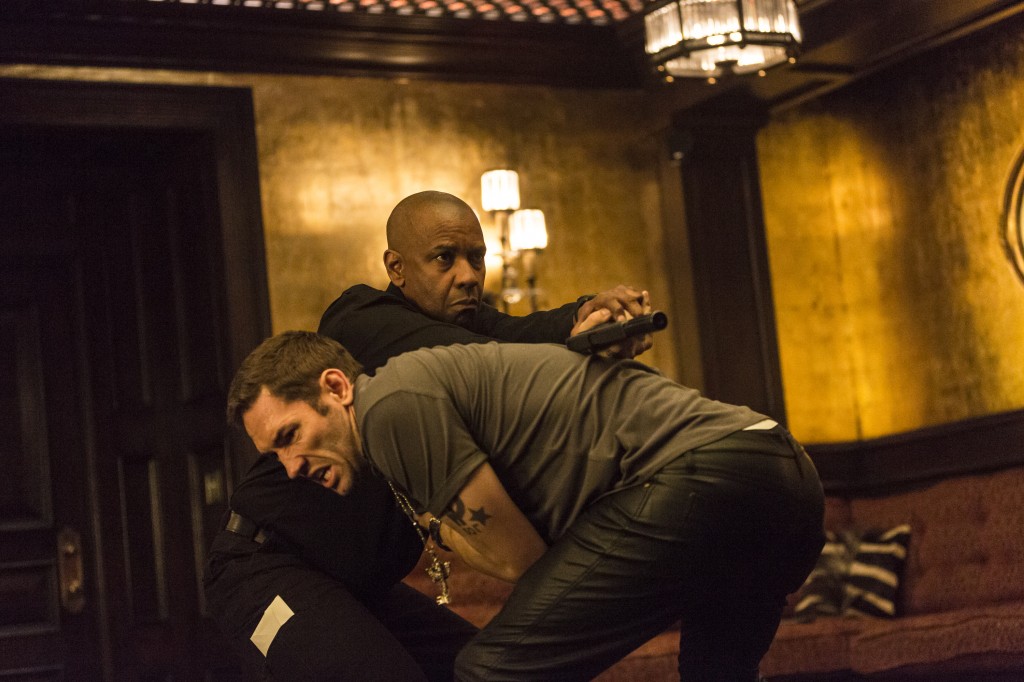Thu 25 Sep 2014
Bang Bang, But Hold the Kiss Kiss
Posted by admin under Film Review, NYC Film Critic
Comments Off on Bang Bang, But Hold the Kiss Kiss
I don’t remember watching full episodes of The Equalizer during its ’80s heyday, but I do have a dim memory of the ads that played between the shows I actually watched. As I recall, the generally featured lots of gunplay, the occasional explosion and the show’s gray-haired star, Edward Woodward, glowering into the camera. While I can’t accurately say if those “Next time on…” teasers accurately reflected the content of the show, they do more or less sum up what happens in the movie version, which offers two full hours of gunplay, explosions and Denzel Washington (taking over from Woodward) glowering into the camera. In that respect, The Equalizer could be considered an entirely faithful adaptation of its source material…or at least, the advertisements for its source material.
In actuality, though, this Equalizer bears only a passing resemblance to the TV show. In the ’80s version, the British-born Woodward played New York-based ex-intelligence officer Robert McCall, who lent his superior tactical and combat skills to innocent victims in need of protection from various kinds of criminals, ranging from kidnappers to drug runners. Washington’s McCall is also a retired government operative, but he’s not the type to advertise his services in the way that Woodward literally did. (On the show, folks found the Equalizer via the ad he placed in the classified section of a major metropolitan newspaper.) Since leaving the spy game following an unspecified tragedy, Robert’s done everything he can to lead a quiet, unremarkable life, moving to a working-class neighborhood in Boston and punching the clock at the local hardware megastore. And when his memories of the past keep him from falling asleep—which is often—he grabs a good book and wanders the streets, eventually settling down in an all-night diner where he nurses a cup of hot tea (with a teabag he brings with him) and occasionally chats with some of the other customers who come in, including teenage prostitute, Teri (Chloë Grace Moretz).
It’s Teri—or, more accurately, her employers—who eventually drags McCall out of retirement. After she receives a severe beating for daring to defy orders, her late-night diner companion tracks down the guys responsible and dishes out a severe punishment that none of them walk away from. At first, Robert thinks that’s the end of it, but it turns out those lowlifes happen to be high-rollers in the Russian mob, which promptly dispatches brutal enforcer, Teddy (Martin Csokas), to Boston to get to the bottom of what happened and punish the guilty parties. It isn’t long before an all-out war erupts Beantown, as lone soldier McCall taking on an army of nameless Russian bad guys without any assistance, or even acknowledgement, from the federal government. You’d think that a sudden spike in the death of Russian immigrants in and around the Boston area would interest the White House—or, for that matter, the Kremlin—but everyone seems content to just let this battle play itself out, regardless how it might affect larger geopolitical global relations.
The Equalizer may have very little in common with the ’80s TV series of the same name, but the way it unapologetically encourages audiences to root for an American movie star to kill hoards of evil foreigners feels very much of that era. It’s also consistent with director Antoine Fuqua’s last movie, the repugnant Olympus Has Fallen, in which Gerard Butler was the last man standing in a White House overrun by a North Korean terrorist squad. At least here, the Russian characters are cartoonish enough that their demonization and resulting slaughter is slightly less offensive than the “Yellow Peril” caricatures in Olympus. (The violence is less brutal as well; it’s still bloody, but that blood is filtered through a stylized lens that can make it entertaining in that big, dumb, loud action movie way.) While the two films aren’t overtly political, it’s hard to miss the staunchly conservative streak that runs through them both. Fuqua seems to be a big proponent of the Rambo school of foreign policy, where all it takes is one well-trained American warrior to defeat our nation’s enemies at home and abroad. Indeed, by the end of The Equalizer, McCall has graduated from killing mere pimps to going after major Russian criminals—criminals that the government certainly ain’t going to touch.
It takes an actor of supreme gravity to anchor a movie that gets as silly as The Equalizer does and Fuqua has an ace in the hole with his leading man, Washington, who he previously directed to an Oscar win in the 2001 cop drama, Training Day. McCall is a very different character from Alonzo Harris, of course; where that character encouraged the star to showboat in grand style, this one calls for the same stoic grace he’s shown in movies like He Got Game or even that Taking of Pelham 123 remake. The “quiet, but deadly” look suits Washington nicely—he radiates a low-key charm that helps you buy into his character at all times, even as the film itself goes off the deep end in terms of realism. I miss the movie that The Equalizer might have been had it followed Washington’s lead—a grounded, street-level view of vigilantism in the modern age, as well as the personal sacrifices good people make when they employ less-than-good means to achieve supposedly just ends. That’s the film Fuqua teases us with only to decide that, all things being equal, he’d rather just have his Equalizer shoot first and ask questions later.


No Responses to “ Bang Bang, But Hold the Kiss Kiss ”
Sorry, comments for this entry are closed at this time.